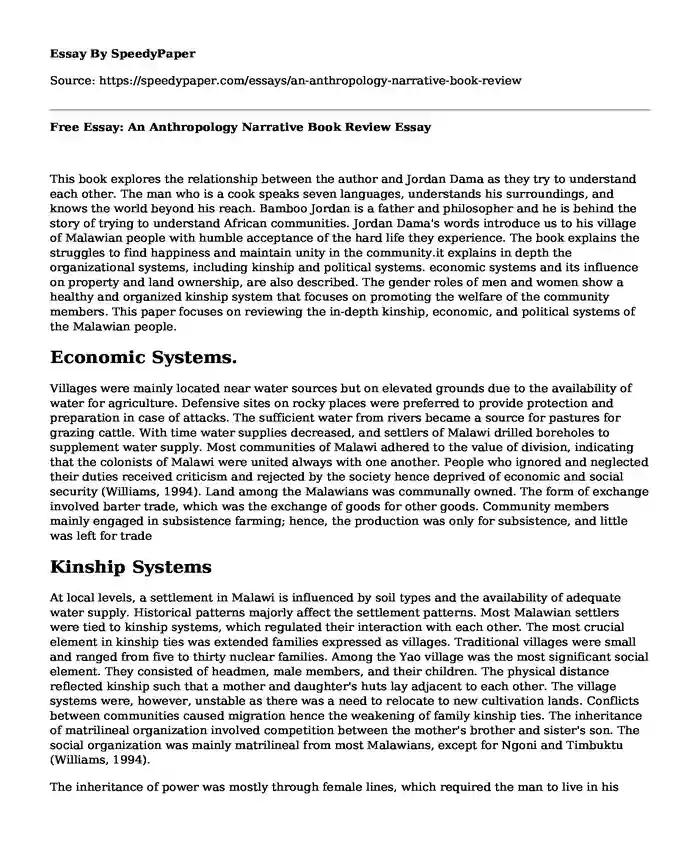
| Essay type: | Book review |
| Categories: | Anthropology Society Community Books |
| Pages: | 4 |
| Wordcount: | 852 words |
This book explores the relationship between the author and Jordan Dama as they try to understand each other. The man who is a cook speaks seven languages, understands his surroundings, and knows the world beyond his reach. Bamboo Jordan is a father and philosopher and he is behind the story of trying to understand African communities. Jordan Dama's words introduce us to his village of Malawian people with humble acceptance of the hard life they experience. The book explains the struggles to find happiness and maintain unity in the community.it explains in depth the organizational systems, including kinship and political systems. economic systems and its influence on property and land ownership, are also described. The gender roles of men and women show a healthy and organized kinship system that focuses on promoting the welfare of the community members. This paper focuses on reviewing the in-depth kinship, economic, and political systems of the Malawian people.
Economic Systems.
Villages were mainly located near water sources but on elevated grounds due to the availability of water for agriculture. Defensive sites on rocky places were preferred to provide protection and preparation in case of attacks. The sufficient water from rivers became a source for pastures for grazing cattle. With time water supplies decreased, and settlers of Malawi drilled boreholes to supplement water supply. Most communities of Malawi adhered to the value of division, indicating that the colonists of Malawi were united always with one another. People who ignored and neglected their duties received criticism and rejected by the society hence deprived of economic and social security (Williams, 1994). Land among the Malawians was communally owned. The form of exchange involved barter trade, which was the exchange of goods for other goods. Community members mainly engaged in subsistence farming; hence, the production was only for subsistence, and little was left for trade
Kinship Systems
At local levels, a settlement in Malawi is influenced by soil types and the availability of adequate water supply. Historical patterns majorly affect the settlement patterns. Most Malawian settlers were tied to kinship systems, which regulated their interaction with each other. The most crucial element in kinship ties was extended families expressed as villages. Traditional villages were small and ranged from five to thirty nuclear families. Among the Yao village was the most significant social element. They consisted of headmen, male members, and their children. The physical distance reflected kinship such that a mother and daughter's huts lay adjacent to each other. The village systems were, however, unstable as there was a need to relocate to new cultivation lands. Conflicts between communities caused migration hence the weakening of family kinship ties. The inheritance of matrilineal organization involved competition between the mother's brother and sister's son. The social organization was mainly matrilineal from most Malawians, except for Ngoni and Timbuktu (Williams, 1994).
The inheritance of power was mostly through female lines, which required the man to live in his wife's house. There was a strong unity between siblings and especially those between sisters and brothers. Kinship ties focused on village headmen to whom villagers were related matrilineally or patrilineally. The female line controlled resources, while the male leadership governed the principles of living. The kinship organizational structure was hierarchical, which ranged from chiefs to individual family members. Managers played the roles of land allocation, judicial matters, and ethical responsibilities.
Gender Roles
In households, women are responsible for domestic chores like cleaning and cooking.men were responsible for doing more burdensome chores like building and maintaining structures. Farmwork and childbearing were tasks that were shared between husband and wife. Where both partners were present, the male was considered to be the head of the family. Children took the roles of grazing animals (Williams, 1994). Older siblings took care of their young ones. Both male and female children were groomed to take over the functions of their parents.disciplining of children was a role of both parents.moral values were regarded highly by the community of Malawians; hence children were required to maintain high standards of discipline.
Political Systems
The villages in Malawi were headed by chiefs who played a principal role in maintaining the norms and traditions of a society. The manager became the reference for ethical conduct and enforcing customs. The leaders dictated the guidelines for the distribution of external resources like food and harvests. He was the ritual representative whose role was to appease ancestral spirits in times of calamities like drought and flooding. Village headman came second in the political organization who inherited his position from the female line (Williams, 1994). The responsibility of a headman mainly involved maintaining unity in a village and solving disputes through his wisdom. A new headman took over the wife and children of his predecessor.he owned the rights to grant ownership of land to outsiders that he trusted.in cases of overpopulation, the headman sought land from other places for the villagers. The lowest unit of administration narrowed down to individual households among the Cewa, and Yao.households were responsible for organizing themselves to increase agricultural productivity.
References
Williams, B. T. (1994). Bambo Jordan: An Anthropological Narrative. Waveland Press.
Cite this page
Free Essay: An Anthropology Narrative Book Review. (2023, Mar 19). Retrieved from https://speedypaper.com/essays/an-anthropology-narrative-book-review
Request Removal
If you are the original author of this essay and no longer wish to have it published on the SpeedyPaper website, please click below to request its removal:
- Free Essay on How Advertising Today Reinforces Racism and Racist Stereotypes
- Organizational Structure Essay Sample for Free Use
- Essay Example on Human Rights and Enlightenment
- Free Essay Sample on Common Logical Fallacies
- Essay Sample on Sexual Harassment in Ford Motor Company
- Understanding Child Neglect. Paper Example
- Essay Sample on Ethical Issues in Advertising
Popular categories




